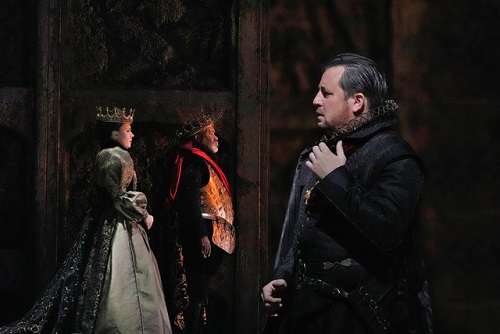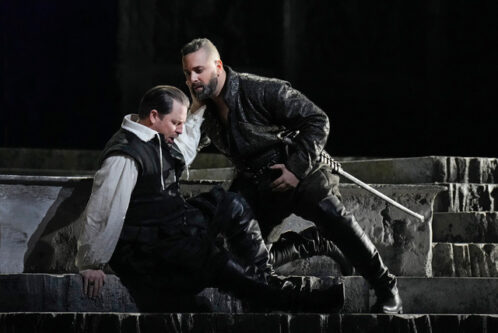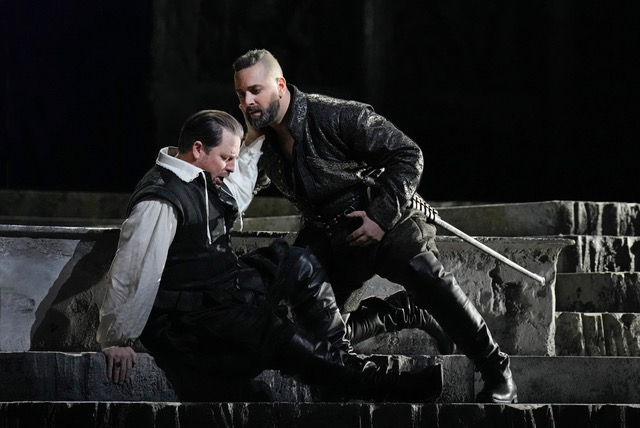 United States Verdi, Don Carlos: Soloists, Metropolitan Opera Chorus & Orchestra / Yannick Nézet-Séguin (conductor). Metropolitan Opera, New York, 28.2.2022. (RP)
United States Verdi, Don Carlos: Soloists, Metropolitan Opera Chorus & Orchestra / Yannick Nézet-Séguin (conductor). Metropolitan Opera, New York, 28.2.2022. (RP)

Production:
Director – David McVicar
Sets – Charles Edwards
Costumes – Brigette Reiffenstuel
Lighting – Adam Silverman
Movement director – Leah Hausman
Cast:
Don Carlos – Matthew Polenzani
Élisabeth de Valois – Sonya Yoncheva
Rodrique – Etienne Dupuis
Philippe II – Eric Owens
Eboli – Jamie Barton
Grand Inquisitor – John Relyea
Thibault – Meigui Zhang
Count of Lerme – Joo Won Kang
Monk – Matthew Rose
Royal Herald – Eric Ferring
Countess of Aremberg – Anne Dyas
For the first time since its founding in 1883, the Metropolitan Opera presented Verdi’s Don Carlos in the original five-act French version. It premiered in Paris in 1867, but Verdi composed much more music for the opera than could ever be used and was making cuts even before it was mounted. Verdi later authorized an Italian translation of the libretto and reworked it extensively for various productions during his lifetime. The Met makes no claim that the version used in this production is authentic or complete, knowing full well that it is the sort of thing that devotees of the opera will be arguing over forever.
History was made, however, before the curtain rose for the premiere of David McVicar’s new production. The Met’s general manager, Peter Gelb, addressed the audience by offering support for the Ukrainian people. He also added that Verdi’s Don Carlos is set in one of the darkest chapters in European history, the Spanish Inquisition, and that it is incomprehensible that similar atrocities are occurring with the Russian invasion of Ukraine.
The Met chorus then appeared on stage and sang the Ukrainian national anthem. A single male stood center stage with his hand across his heart, singing from memory: 24-year-old company member Vlad Buialskiy, whose entire family is still in Ukraine. Two days earlier, Gelb had announced that the Met would sever ties with all artists or institutions that support Vladimir Putin or are supported by him, and that the policy will remain in effect until the invasion and killing have stopped, order is restored and restitutions are made.

McVicar’s concept for Don Carlos is grand if not spectacular. Two large structures with rows of arched alcoves dominate the stage. Towering, leafless trees transform it into the Forest of Fontainebleau in winter where Élisabeth and Don Carlos first meet and fall in love. Sarcophagi, which rise from below, recast the scene as the subterranean chamber at the monastery of St. Just where Don Carlos’s grandfather Charles V is entombed. Incense wafts from a giant thurible suspended from above.
With relative ease, the space is transformed into the monastery’s surprisingly treeless garden where Princess Eboli entertains her ladies with a song. Barren, it becomes a plaza where the condemned heretics and apostates are paraded and tortured: two of the unfortunate victims are bound to stone columns and strangled to death, while the others are led off to be burned at the stake. The Met chorus is tucked neatly out of the way in the alcoves.
Philippe’s study, dominated by an enormous figure of the crucified Christ, is suggested by Charles V’s tomb serving as a table. Massive grates descended from above, creating the prison where Carlos is held. All of this makes for speedy and efficient scene changes, which were a godsend for a performance that clocked in at about five hours.
Opulence comes from Brigette Reiffenstuel’s costumes. Élisabeth and her courtiers wear luxurious winter white for the Fontainebleau scene, while the Spanish court is in somber black. Flashes of color are rare: cardinals and bishops are opulently robed in the auto-da-fé scene; a court jester, bedecked in garish, multi-colored ribbons, prances about as the heretics are sent to their deaths; the magnificent crowns worn by the monarchs are laden with jewels.
The Met boldly proclaimed that it had assembled ‘a world-beating cast of opera’s leading lights’ for Don Carlos, which indeed lived up to the hype. Matthew Polenzani, who has become an international star and a Met mainstay since his inauspicious 1997 debut as Boyar Kruschov in Mussorgsky’s Boris Godunov, was Don Carlos. For anyone who thought the role would be a vocal and dramatic stretch for him, the tenor proved the naysayers wrong. His realization of the doomed Don Carlos was dramatically acute, and his gleaming tenor easily soared above the Met orchestra.
More than once, Élisabeth de Valois asserts that she is the daughter of a king, and Sonya Yoncheva made that readily apparent in her regal bearing. She sang with consummate artistry and sumptuous tone, instilling her Élisabeth with both nobility and a haunting sense of melancholy.
As the Princess Eboli, her nemesis, Jamie Barton was bold and brash in a Cruella-de-Vil sort of way. She was as commanding vocally as she was visually. Her voice boomed through the vast expanse of the Met in ‘O don fatal’, when the princess expresses her remorse for stealing both the queen’s jewels and her husband. Earlier in the opera, her Veil Song was spirited if, at times, belabored.
Youthful and dashing, baritone Etienne Dupuis won the audience’s heart with his Rodrique. Few have captured the brotherly love that Rodrique feels for Don Carlos so touchingly as did Dupuis, who sang with an intriguing mix of bravura and tenderness.
Eric Owens’s subtle characterization of King Philippe was understated but chilling, with few glimpses of the human side of the unyielding monarch who seems devoid of any paternal affection towards Don Carlos. Owens’s bass-baritone, while still an imposing instrument, was drier and less powerful on this occasion. The personification of true evil, however, was the domain of John Relyea’s Grand Inquisitor, whose cavernous low notes sent shivers down one’s spine.
In supporting roles, soprano Meigui Zhang made for an energetic, bright-voiced Thibault. Tenor Eric Ferring shone in his brief appearance as a herald, and soprano Amanda Woodbury’s lovely soprano descended from above as the Celestial Voice at the end of the auto-da-fé scene.
The true star of the evening, however, was Yannick Nézet-Séguin who was conducting the excellent Met orchestra. When we have time to reflect, there will be a realization that Nézet-Séguin is making history. Last week at Carnegie Hall, he led the Philadelphia Orchestra in a program that concluded with Beethoven’s Ninth Symphony; he then stepped in to conduct three concerts with the Vienna Philharmonic Orchestra after Valery Gergiev was precluded from performing due to the Russian invasion of Ukraine. Now Don Carlos and a revival of Tosca awaited him at the Met this week.
Rick Perdian
